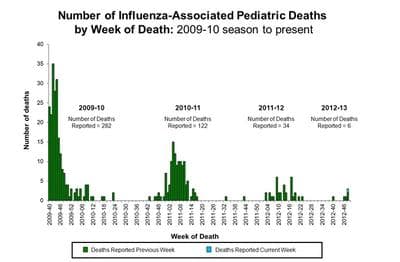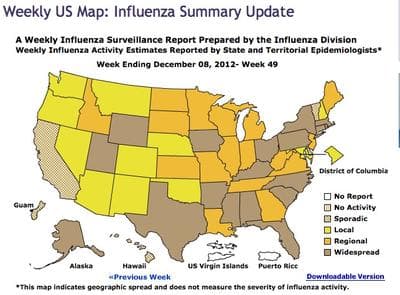Advertisement
Why Get A Flu Shot Now: Unusually Early Season, Already Here

To all our friends who have not yet gotten their flu vaccines yet, beware: This is looking like a very good year. For the flu, that is. A bad year for its human hosts.
This year's flu season has kicked off early and strong in Massachusetts and elsewhere. You may already be seeing those empty seats in classrooms and workplaces.
State Department of Public Health data indicate that flu is already more widespread now than at any point last year — and levels usually don't peak until mid-February, said Dr. Ben Kruskal, chief of infectious diseases at Harvard Vanguard Medical Associates.
Given that outlook, is it too late to get a vaccine?
Absolutely not, he said. "The CDC generally recommends vaccinating through April, and that's partly because of the variability in how bad it is and how long it lasts. This year we're certainly having an early start; the question is whether we'll have an early finish. The main thing is, it certainly isn't too late. This is prime time to get it because we're starting to see a lot of flu activity which is unusually early and unusually severe this year."
And it takes the vaccine a couple of weeks to fully kick in?
It's a little complicated. It takes two weeks to produce measurable antibodies, but we don't know how quickly you get protection. It probably does take some time — you're probably not protected the next day.
And i believe the CDC is also saying the vaccine is a good "fit" this year for the viruses that are circulating?
Yes, the strains of flu that have been isolated so far do look very much like they're matching the vaccine well, so the vaccine should be effective in preventing the flu this season.
One concern I hear from some is that the vaccine is not as effective as once portrayed --
There are a variety of studies that keep coming out trying to look at the effectiveness of the flu vaccine, and it's a really hard thing to measure. There are a lot of studies that came out over the last five to ten years, many of which were not very rigorous methodologically, and showed very rosy numbers for the efficacy of the vaccine. And more rigorous studies came out more recently showing that it's not as good as we thought it might be.
But the CDC still says it's the most effective way to prevent flu...
It's effective, but it has to be part of a package that includes things like covering your cough and washing your hands.
I've also seen reports that getting a seasonal flu vaccine may make you more susceptible to H1N1 flu.
That’s a really complicated issue. There were a ton of papers published during the H1N1 pandemic and since then looking back at the potential effects of the two vaccines on their respective and non-respective diseases, and I don't think there’s a very clear result. There were certainly some people who claimed one or the other vaccine might potentially make you more susceptible to the other flu, but I would say that’s not well-established or widely accepted. Also, it's a moot point now, since the current vaccine contains both the 2009 H1N1 strain (now part of our seasonal flu mix) and a regular seasonal H3N2 strain, as well as a B strain. So when you get vaccinated this year, you get protection against all of these.
One friend of mine says she avoids the vaccine because it makes her sick.
The injectable vaccine carries dead virus, you cannot catch flu from it. Though it's common to get some mild fever or muscle aches as a result of the vaccine. The other thing is that because the symptoms of flu are so non-specific, and because people are looking for them after they get the vaccine, there is a widespread sense of 'Oh, I got the vaccine and this happened, therefore it was due to the vaccine,' when it was actually just another viral infection.
In the nasal vaccine, you get attenuated flu virus — like the attenuated chicken pox virus in that vaccine — so you might have some mild symptoms afterward. It's not uncommon to have sniffles for a couple of days.
The CDC says flu causes between 3,000 and 41,000 American deaths a year. How can the range be that broad?
The flu is one of the wiliest germs around. It's evolution in action. And the early occurrence and rapid rise this year make us concerned that this may be a more severe flu season than the last one, so it's very important for people to get vaccinated.
Readers, that chart at the top may not be too scary for this year — yet — but it's a reminder that people, children, die from flu. Some added incentive from the Massachusetts Medical Society:
What are complications from the flu?
Pneumonia is common, as are ear and sinus infections and dehydration. Patients with chronic conditions, such as diabetes, asthma, or congestive heart failure, may see those conditions get worse, posing serious threats to health. And no, you can’t get the flu from a flu shot.
Who should get vaccinated and who is most at risk?
Everyone six months and older should get a flu shot every year. Those at highest risk from complications from the flu are pregnant women; children under 5; adults 65 and older; people with asthma, diabetes, heart disease, or weakened immune systems; patients with neurological and neurodevelopmental conditions such as epilepsy, seizure disorders, or muscular dystrophy; people who are morbidly obese; and people in nursing homes and long-term care facilities. They, and the people they come into close contact with, including health care workers, should be vaccinated.
Where can I get a shot?
Plenty of vaccine is available and at multiple locations. Check with your physician or local board of health to see when and where flu vaccine and clinics will be available. You can also visit the Flu Vaccine Finder at http://flushot.healthmap.org
Further reading: Unusually early flu season intensifies

